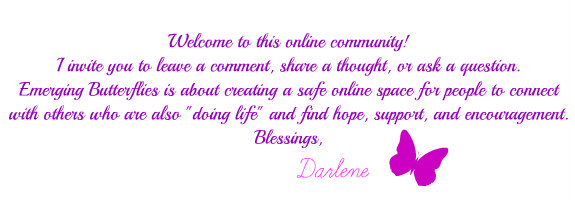With the passing of Father's Day last Sunday, I was thinking about my dad. In so many ways he was a good father, but he was not perfect. And, in so many ways I was a good daughter, but I was not perfect either. Sometimes, I remember sweet times together: vacations, quiet times at home, exploring the back roads of America, working in his sawmill or up in the woods, or just the wonderful man that he was. Then at other times old scenes play through my mind, scenes of times I wish I could change.
When he was alive, there were times I had to reconcile what he had done with what I wish he had done, but nowadays, I think about things I said or did that I wish I could change. I remember times that I acted selfishly or said things in anger that I regret. I remember times I was impatient or inconsiderate and I feel sad and grieved.
I cannot go back and change these things. While I can learn from them, and seek to act differently in current relationships, I cannot change what was. In these times I remember an admonition given by a pastor friend to mourners at the funerals he performed. He would tell them that the person who had passed was now beyond all the regrets, failures, imperfections, and hurts of this life. I am comforted by that and have hope in the fact that now my dad can see perfectly and that he understands in a way he could not here on earth.
Still, I feel the grief and sadness of my failures. Then I hear the gentle whisper of God's Spirit to my heart,
If we confess our sins, he is faithful and just to forgive us our sins
and to cleanse us from all unrighteousness. (1 John 1:9 ESV)
Forgiveness.
Not everyone who reads these words will identify with what I am about to say, in fact, some may have had a very different experience, but I was blessed with a dad who was willing to forgive. I know that if he were here and if I were to go to him and apologize for these failures of mine, he would forgive me. He loved me and nothing I have done would keep him from loving or forgiving me. My challenge now is to live in the truth of his character and his forgiveness.
The same is true of God. He too will forgive me for my failures and when I live in the truth of His forgiveness, I find freedom.
The last person I must forgive is myself. Surely if God and my dad can forgive me, I too can forgive myself.
What Was.
Each of us have our own stories of what was. Some stories may be about our own failures and some stories may be about how the failures of others have impacted us. In either case we cannot change what was, yet what was may have left wounds that need healing, scars that are still raw and tender.
What We Wish Had Been.
Perhaps we wish that things in our past had been different, that our parents had been or acted differently, that our siblings had made different decisions, that we had made different decisions. Bitterness and grudges may hold us captive. Broken relationships may have resulted. Cycles of life that hold us in defeat may plague us. A blog post or a few verses will not heal these things for they are complicated and take time to heal. Still there is HOPE!!! Healing is possible.
Reconciliation . . . Forgiveness.
Healing begins with forgiveness - forgiving others and seeking and accepting forgiveness from others. A few years ago I wrote about forgiveness and reconciliation. If you'd like to look at those posts, click on these links: forgiveness, repentance, and reconciliation. Forgiveness is critical to reconciliation and healing. Although the journey may be long, it is worthwhile and leads to freedom, hope, and abundant life.




